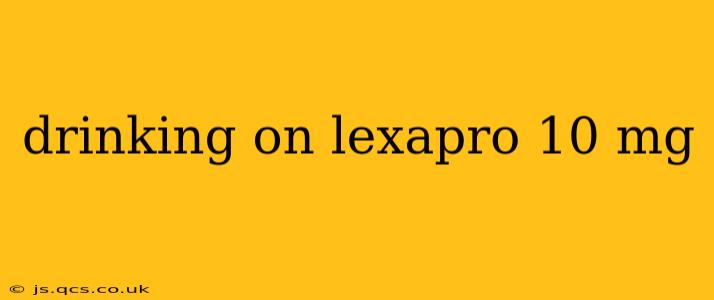Many individuals prescribed Lexapro (escitalopram), a common selective serotonin reuptake inhibitor (SSRI) antidepressant, wonder about the effects of combining it with alcohol. This guide will explore the potential risks and interactions between Lexapro 10mg and alcohol consumption, answering common questions and providing valuable information for informed decision-making. Always consult your doctor or psychiatrist before mixing any medications with alcohol.
What Happens When You Mix Lexapro and Alcohol?
Combining Lexapro and alcohol can lead to several undesirable effects, some mild and others potentially serious. The interaction is primarily due to how both substances affect the central nervous system (CNS). Alcohol is a depressant, slowing down brain activity, while Lexapro affects serotonin levels, a neurotransmitter influencing mood, sleep, and other functions. When combined, these effects can be amplified, leading to:
- Increased Sedation and Drowsiness: This is one of the most common side effects. The combined sedative effects can make you feel extremely sleepy, impair your judgment, and slow your reflexes.
- Enhanced Risk of Blackouts: Alcohol impairs memory, and this effect can be exacerbated by Lexapro, increasing the likelihood of experiencing blackouts or memory lapses.
- Increased Risk of Falls and Accidents: The combination of drowsiness and impaired coordination significantly increases the risk of falls, accidents, and injuries.
- Worsened Depression or Anxiety Symptoms: While Lexapro is intended to alleviate these symptoms, alcohol can paradoxically worsen them in some individuals, potentially leading to increased feelings of sadness, anxiety, or irritability.
- Gastrointestinal Problems: Both Lexapro and alcohol can cause nausea and digestive upset. Consuming them together might intensify these side effects.
- Interaction with Other Medications: If you're taking other medications alongside Lexapro, alcohol could further complicate the interactions and increase the risk of adverse effects.
How Much Alcohol is Too Much When Taking Lexapro?
There's no universally safe amount of alcohol consumption while on Lexapro. The safest approach is to avoid alcohol entirely. Even small amounts can potentially interact negatively with the medication. Individual sensitivities vary, and what might be tolerable for one person could cause significant problems for another. Factors like your age, overall health, and the duration of Lexapro use all play a role.
Can Alcohol Reduce the Effectiveness of Lexapro?
While there isn't definitive research showing alcohol directly reduces Lexapro's effectiveness in treating depression or anxiety, alcohol's impact on the CNS and potential for worsening symptoms can indirectly interfere with the medication's therapeutic benefits. Consistent alcohol use can destabilize mood and hinder the progress made with Lexapro treatment.
Does Drinking Alcohol While on Lexapro Cause Withdrawal Symptoms?
Stopping alcohol abruptly after prolonged heavy use can trigger severe withdrawal symptoms, regardless of whether you're taking Lexapro. These symptoms can range from mild discomfort to serious medical emergencies. If you're concerned about alcohol withdrawal, seek professional medical help immediately. Your doctor can guide you through a safe and supervised detoxification process.
What Should I Do if I Accidentally Drink Alcohol While Taking Lexapro?
If you accidentally consume alcohol while taking Lexapro, monitor yourself closely for any unusual symptoms. Pay attention to your mood, coordination, and overall well-being. If you experience any concerning side effects, contact your doctor or seek medical attention immediately.
Is it Safe to Drink Alcohol After Stopping Lexapro?
After stopping Lexapro, it’s crucial to allow sufficient time for the medication to clear your system before resuming alcohol consumption. The duration varies depending on individual factors, including metabolism and dosage. It's always best to consult your doctor to determine when it’s safe to resume drinking.
Disclaimer: This information is intended for educational purposes only and should not be considered medical advice. Always consult your doctor or psychiatrist before making any decisions regarding your medication or alcohol consumption. They can provide personalized guidance based on your specific health status and medical history.
